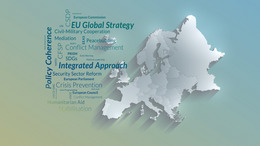No budget support without reform steps
In order to counteract renewed disappointment among Tunisia’s population and the threat of internal turbulence, Europe should try to support reform-oriented forces in their push to enhance the state’s capacities and change the cost-benefit calculations of status quo actors. Ultimately, it is a matter of persuading the political elites to cooperate in a results-oriented manner in the interests of the country. We recommend that external partners move away from the practice of budget support despite lack of progress in reform, and consistently link financial injections and tranche disbursements to verifiable steps towards structural reform.
Germany’s so-called reform partnerships, which were introduced in 2017, employ such a mechanism. Berlin engages in financial cooperation with Tunis in areas such as administrative reform (e.g. decentralization), sustainable economic development and protection of resources, especially water and energy. However, funds are distributed only after steps agreed on by both sides have been implemented. Whether the benchmarks have been ambitious enough remains open to discussion. But first results of this partnership are encouraging and funds were transferred to Tunisia in 2018 and 2019. In addition, the German government agreed to convert part of Tunisia’s debt into financing for projects that focus mainly on areas such as administrative reform, economic development, employment, governance and the water sector.
International financial assistance is channeled in large quantities to Tunisia, yet much of it still falls either under a framework in which funds for reforms flow prior to implementation of reform steps or in which conditions for disbursement focus strongly on austerity measures. Neither has been particularly successful in generating significant reform impetus in Tunisia and encouraging the government to take on more ownership and self-initiative.
Since 2015, the European Union has invested €800 million in so-called Macro-Financial Assistant (MFA and MFA-II) programs for the country. In October 2019, it agreed on a third injection of funds to Tunisia within MFA-II, with a loan of €150 million. The main goal is to contribute to political transition and to strengthen economic structures. These funds came with a long list of conditions, ranging from respecting human rights and full compliance with the rule of law to full financial and administrative independence for the Tunisian court of auditors, reforms to the tax system, and elaboration of schemes for reducing unemployment and social transfer programs. But it remains unclear how binding these broad conditions are and what the exact relationship between their implementation and the transfer of financial aid to Tunisia is. Theoretically, the funding mechanism still is “more for more,” meaning that reform progress is being rewarded with more EU support.
For its part, the IMF has a long-standing practice of tying financial support to implementation of austerity and specific reform measures. It negotiated an agreement with Tunisia in 2016, which provides the country with a sum of $2.8 billion under the so-called Extended Fund Facility (EFF). This sum is to be paid out within four years and the agreement is therefore to end in May 2020. To date, $1.6 billion have been distributed, but $1.2 billion have been withheld. The latter is partly due to insufficiently rapid progress on the agreed reforms. At the same time, the Tunisian government has tried – as a result of IMF pressure – to improve the budgetary situation by reducing the deficit, and by enhancing tax revenues significantly in 2018 and 2019. This implies that conditionality can work. Yet, the strong focus on budget rigidity has a downside, which is two-fold: Austerity measures do not automatically lead to better performance and greater trust by citizens in the capacity of the state. And it does not allow Tunisia to “spend for the future,” namely on education, health care and social welfare systems.
A combination of pressure to act and incentives can work very well, something demonstrated by the international Financial Action Task Force on Money Laundering (FATF): When the EU placed Tunisia on the money laundering “blacklist” in 2017, the Tunisian government, which prior to the blacklisting remained passive on the issue, reacted swiftly, implementing promised measures. As a result, Tunisia was removed from the list in October 2019.
A change of mechanism in direct aid to the national budget would have to be accompanied by greater incentives for reforms, for example by more systematically converting public debt into project funds or granting visas to more Tunisian trainees to enable them to learn or work in the EU for a few years. In addition, opportunities for importing certain Tunisian agricultural products into the EU should be improved rapidly, flexibly and generously – without waiting for the conclusion of the EU’s comprehensive trade agreement, which is highly controversial in Tunisia.
Ultimately, the aim at the beginning of 2020 is to send a clear message to the political elites in Tunis in general and the new government in particular: Europe will continue to stand in solidarity with Tunisia and pursue its current cooperation policy – with one exception: From now on, a precondition for direct aid to the national budget is implementation of mutually agreed on structural reform steps, which are considered indispensable for sustainable economic and social stabilization – so-called “resilience.” If these actions succeed, Tunisia can count on even more European support. It goes without saying that such an approach would imply involving a broad set of stakeholders, including civil society actors, in outlining precise reform steps and benchmarks – and, last but not least, it would require greater coordination between the EU, the bilateral donors and the IFIs.
![[Translate to English:] Hand wirft einen Stimmzettel in Wahlurne vor tunesischer Fahne](/fileadmin/files/_processed_/f/b/csm_1144129027shutterstock_593137157_Premier_be_ST-EZ_3ac8f6070f.jpg)


![[Translate to English:] Ein Mann läuft durch eine komplett zerstörte Straße](/fileadmin/files/_processed_/d/e/csm_91467146816969008478_36ccc11324_o_8477bfdb23.jpg)
![[Translate to English:] Gruppenbild mit tunesischer Delegation, den georgischen und ukrainischen Verhandlungsführerinnen Tamara Kovzeridze und Veronika Movchan sowie den Vertretern der Bertelsmann Stiftung Miriam Kosmehl und Christian-Peter Hanelt](/fileadmin/files/_processed_/0/7/csm_1920756516IMG_0123_e448663d83.jpg)


